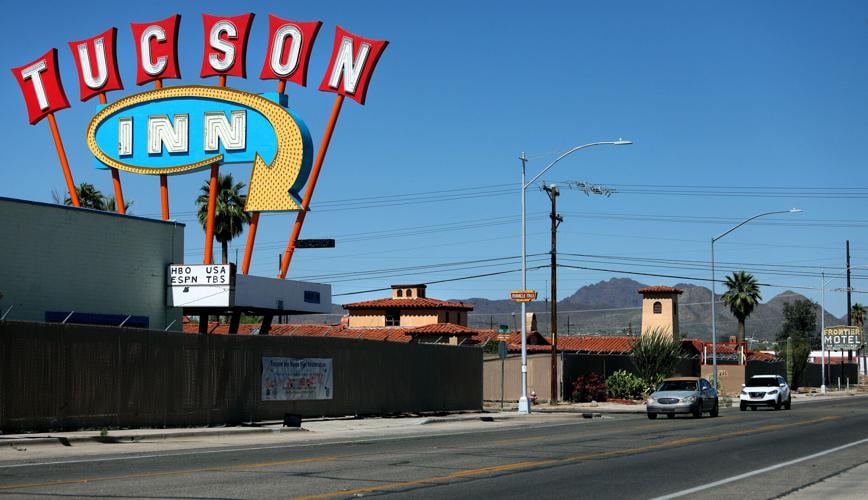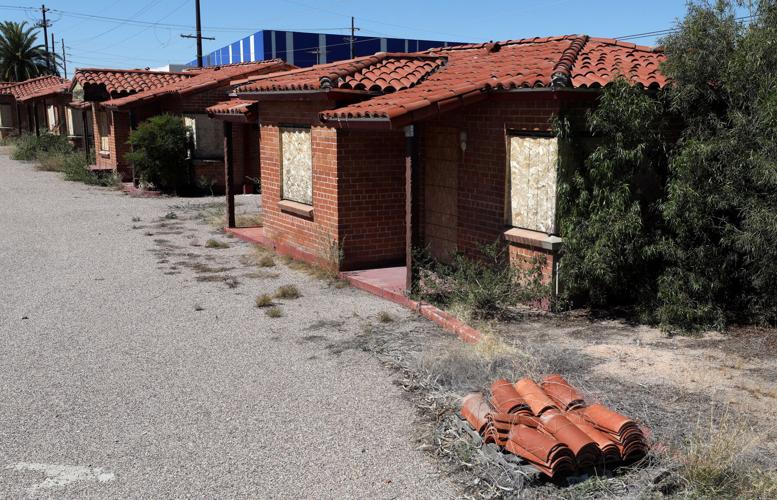Go up and down Tucson’s old tourist strip, and you’ll catch intriguing glimpses of the city’s past.
Old motor courts, symbols of a new way to travel when they were built in the mid-1900s, line old U.S. Highway 80. You can follow them along East Benson Highway, South Sixth Avenue, North Stone Avenue, West Drachman Street, North Oracle Road and West Miracle Mile. Some are still functioning as motels, mostly low-end operations.
Of course people want to preserve these old places, especially the cool signs. Preservationists crowded a Pima Community College board meeting May 22 to insist that the board save the three old motor courts the college owns along Drachman, next to its downtown campus.
The problem is, there is only one reliable way to reuse the old motor courts and make a go of it without a major investment: Turn them into low-income housing. There have been a couple of other success stories, such as the Downtown Clifton, now a boutique hotel on South Stone, and Monterey Court, a restaurant music venue and retail hub along Miracle Mile.
But from Benson Highway in South Tucson to North Oracle Road and Miracle Mile in Tucson, the simplest solution for saving these decaying old icons is to bring them up to code and use them as bottom-rung housing. And that’s not what Pima Community College is looking at, which makes preserving them expensive.
Complicating matters further, it was the old board majority, including leading historic preservationist Demion Clinco, that bought the three motels. In November, Clinco was voted out, and the new board majority is looking more skeptically at the old board’s nearly $4 million investment in the three properties.
The board is considering four possibilities for its motor courts. The cheapest option, at $3.7 million, would involve tearing down all three motels but preserving the signs and making the area into a parking lot. The most expensive option would be $35.7 million to rehab the Frontier Motel and Copper Cactus, but preserve only the front part of the Tucson Inn while building a new structure on that old motel’s grounds.
Unsurprisingly, they would be put to use as college buildings, not housing. And that means it would likely cost more to make them into useful structures.
‘Lowest level of the housing food chain’
This is nothing like what’s going on in South Tucson. There, Casa Maria, the longstanding charity with a soup kitchen on E. 25th St., bought a motor court called El Camino Motel, at 297 E. Benson Highway, in March.
The cost of the 20-unit property was $850,000; Casa Maria plans to raise $400,000 to upgrade the units by adding kitchenettes. The strategy is to keep bottom-end housing available in the low-income town of 1.2 square miles.
“They’re the lowest level of the housing food chain,” Casa Maria’s Brian Flagg told me. Naming off other similar sites, he said “We need places like Spanish Trail, the Sixth Avenue Suites, the motels owned by PCC. It really, truly needs to be affordable.”
Flagg, Roxanna Valenzuela and Cesar Aguirre formed a three-person team who are both affiliated with Casa Maria and were elected to the South Tucson City Council last year. While they’ve had a hard time winning a majority for their favored housing policies on the council, they are having more success with the same pursuits at Casa Maria.
One of their key ideas is to minimize the displacement of existing residents that happens when outsiders come in and redevelop properties to rent to higher-income tenants.
After the El Camino purchase, they are going after three other motor courts in the city: The Arizona, Paradise and Star motels. They are also trying to enlist the city in seeking to expel the owner of the Spanish Trail and South 6th Avenue Suites.
“This would result in approximately 365 units saved and would cost roughly $7 million,” Flagg said in a letter to Casa Maria supporters.
Transformations have succeeded
Within the city of Tucson, at least four old motor courts have become low-income housing. The Downtown Motor Hotel on South Sixth Avenue was transformed into the Downtown Motor Apartments — a new, four-story apartment building behind the old motel’s preserved office and sign.
Ghost Ranch Lodge on West Miracle Mile became low-income housing for seniors and disabled people, thanks to a hard-fought efforts to assemble federal, state and local grants and tax credits.
Now the city is transforming three older motor courts along North Oracle Road and Miracle Mile into housing: The No-tel Motel (formerly the DeAnza), at 2425 North Oracle Road, the Don Motel just north of that, and the Amazon Motel, 1135 W. Miracle Mile.
The project involving the former No-tel Motel, dubbed the Milagro on Oracle, incorporates two old motels that are separated by a vacant lot, where a new four-story, 48-unit structure will be built. The total construction cost is estimated at $14 million.
The Amazon Motel, on the other hand, won’t change that much and will serve as studio apartments for those coming out of homelessness, said architect Corky Poster, who is designing both projects and is a fan of preserving and reusing the old motels.
“We are adding kitchenettes,” he said of the Amazon. “There’s an alcove in those units that is plumbed and perfectly set up.”
The construction cost will be about $2 million.
Preservation should be priority
The Pima Community College motels are in two special districts of Tucson. “Thrive in the ‘05” is a multifaceted effort to improve life in the 85705 zip code. The Miracle Mile Historic District joined the National Register of Historic Places in 2017, thanks to Clinco’s nomination.
At the May 22 Pima College board meeting, preservationists argued the new board is obliged to preserve the buildings that the previous board, including Clinco, bought.
“I understand the current board is sort of inheriting these buildings that they may or may not have asked for,” architect Carlos Lozano said. “But I believe you’re inheriting a moral duty to do the right thing. It’s not a legal duty — it’s a moral duty.”
But in my opinion that’s defining the board’s duty way too narrowly. Along with their duty to try to preserve these properties, they also have financial duties to students, employees and taxpayers not to blow millions of dollars on a boondoggle.
Theresa Riel, the current board chair, beat Clinco by 60% to 38% in the November 2022 election despite a big-money campaign in Clinco’s favor. She’s earned some deference to her position. Greg Taylor also won his seat in November, and Wade McLean was appointed in January.
The other two board members, Maria Garcia and Luis Gonzales, abstained from voting for the board’s plan for the motels in 2021. None of the supporters are still on the board.
“They’re beautiful buildings,” Riel told me. “It would be so cool to fix them up. The problem is none of that fits in with our business plan.”
She added, “We’re not in the business of renting out low-income homes.”
I don’t expect them to become landlords to the poor, but I do expect them to find ways to preserve a good portion of what they bought. The Tucson Inn, the most iconic of the motels, could easily go the route of the Downtown Motor Hotel: A preserved front portion and a new building in the condemned back portion.
The other two motels could go any direction, especially if the college would consider off-loading one or both to a new owner. Then, the most logical and inexpensive reuse, housing, could be an option.
To me, the only tragic choice would be to raze them for more parking. Tucson has done plenty of that over the years, and should have learned from our mistakes by now.
A block party was held Dec. 12 to celebrate the lighting of the Tucson Inn sign near Pima Community College's downtown campus. The sign's restoration started as part of the Tucson Historic Preservation Foundation's Neon Sign Project.
Wednesday's event, hosted by the PCC Governing Board, featured a preview of the lit sign, which is set to be full operational in early 2023. Video by Pascal Albright / Arizona Daily Star.




